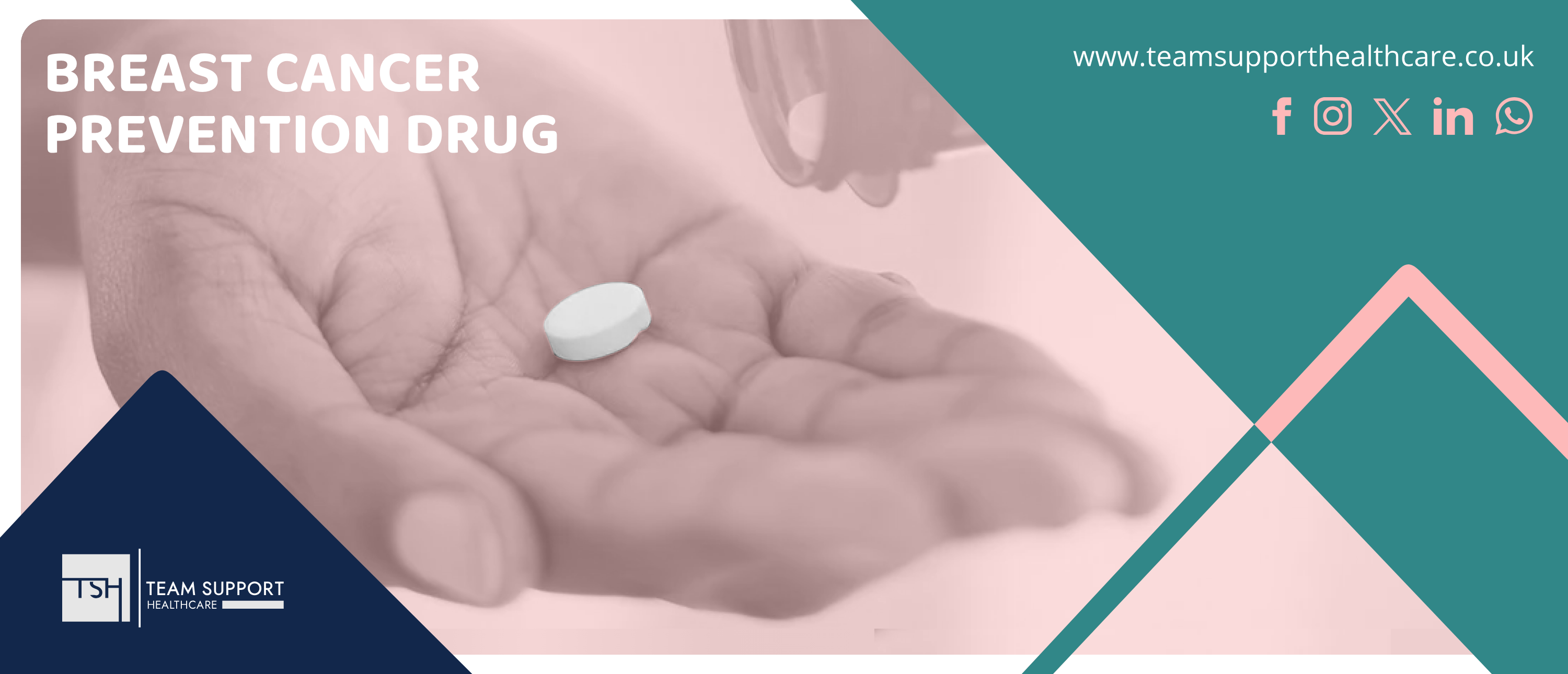Anastrozole: Breast Cancer Prevention
Anastrozole, although not a new drug, is now being repurposed as a preventative for breast cancer. Previously, the drug was predominantly being used to treat the disease. However, this new advancement hopes to reduce the number of women developing the cancer in the first place.
Statistics
The discovery of the drug’s success at preventing breast cancer is a huge step forward for the medical community. Statistics from Breast Cancer UK show that “In 2020, 11.7% of all cancers diagnosed were female breast cancer, making it the most common cancer worldwide”. Data shows that, in the UK alone, there are “around 56,000 new cases of breast cancer every year: that’s over 150 cases every day.”
Anastrozole received its license from the Medicines and Healthcare products Regulatory Agency (MHRA) on 7th November. The NHS hopes that this development “could help prevent around 2,000 cases of breast cancer in England.” – NHS website.
Anastrozole and the Menopause
Anastrozole is a hormone therapy drug and is primarily given to breast cancer patients who have already undergone the menopause. It works “by reducing the amount of oestrogen made in the body.” The reason for this? “Some breast cancers use oestrogen in the body to help them to grow.” – Breast Cancer Now.
The drug is often given after surgery to reduce the risk of breast cancer coming back or spreading. Sometimes the drug is administered in place of surgery (or until surgery is feasible/accessible).
Data shows that “Getting older is the most significant risk for developing breast cancer.
Most breast cancers (80%) occur in women over the age of 50. And the older you are, the higher your risk.” – Breast cancer Now.
“It was first recommended as a preventive option by the National Institute for Health and Care Excellence in 2017, however, with the treatment being unlicensed in this use, uptake has remained low.” – NHS website.
Now that the drug has received its license, the amount of people receiving the drug is set to rise dramatically.
Who is Eligible?
So, who will benefit from this occurrence? The drug is to be offered to “women at increased risk, including those with a significant family history of the disease.” Hereditary diseases can be a black cloud hanging over many. The fear that the individual will also develop said disease is daunting and can be overwhelming. This preventative drug goes some way to providing comfort to those most at risk.
Women with BRCA mutations are also more likely to develop breast cancer at a younger age. You can take a genetics test to see if you have inherited these genes: Test.
According to the NHS website, “Around 289,000 women at moderate or high risk of breast cancer could be eligible for the drug, and while not all will choose to take it, it is estimated that if 25% do, around 2,000 cases of breast cancer could potentially be prevented in England, while saving the NHS around £15 million in treatment costs.”
“We’ve already seen the positive effect Anastrozole can have in treating the disease when it has been detected in post-menopausal women and now we can use it to stop it developing at all in some women.”-Health Minister, Will Quince.
Trials
As with most of their kind, the drug does not guarantee prevention of breast cancer. However, the data coming in so far is promising
“Recent trials show the drug can reduce the incidence of breast cancer by almost 50% in post-menopausal women at moderate or high risk of the disease.
Any woman worried about having a higher than normal risk of breast cancer can contact their GP, who can refer them to a specialist for a full risk assessment taking into account family history.” – The BBC.
Testimonials
“Lesley-Ann Woodhams, 61, was offered anastrozole off-label for the prevention of breast cancer due to being at increased risk of developing the disease, and having a family history of breast cancer. Lesley-Ann completed the full five-year course of anastrozole in January 2023.
She said: “Taking anastrozole was an easy decision for me, as I’d watched my mum battle breast cancer and my risk was very high. Anastrozole reduced my risk of developing breast cancer, meaning I could live a life without constantly worrying or giving a thought to what could be if I’d developed breast cancer. It really was a gift, it gave my family and myself peace of mind and more importantly, a continued future to look forward to. I’m grateful for every day I took this drug – it was life-changing. Anastrozole has allowed me to continue living my life as I’d planned.”- NHS website.
Administration and Side-effects
“The treatment is taken as a 1mg tablet, once a day for five years. The protective effect lasts for years after a woman has stopped taking the drug, officials said.” – The BBC.
The side effects could be reminiscent of the menopause, with hot flushes and fatigue being among the listed. Others include: “feeling weak, pain/stiffness in the joints, arthritis, skin rash, nausea, headache, osteoporosis, and depression. Anyone who suspects they are having a side effect from this medicine is encouraged to talk to their doctor, pharmacist or nurse and report it directly to the MHRA’s Yellow Card scheme.” – NHS website.
We’re Here To Help!
Do you work in the medical field? Are you interested in how TSH can help you in your profession? Get in touch below for a free, no obligation chat with one of our experienced, recruitment experts.
